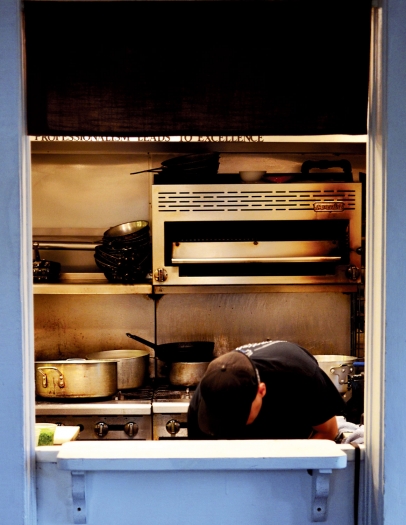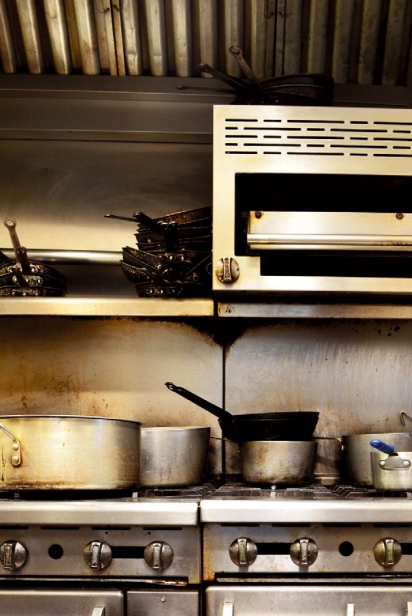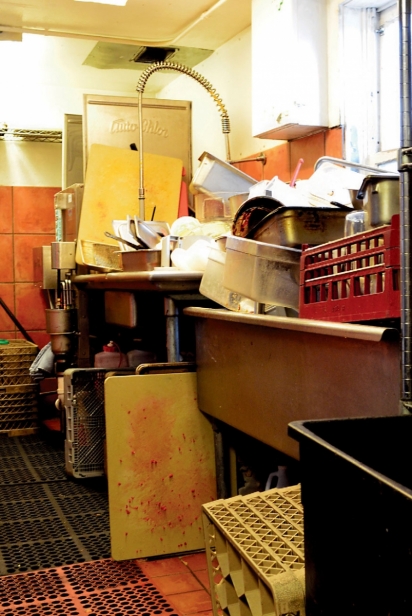Behind the Kitchen Door - A Glimpse at Life of a Kitchen Worker
Fine dining depends on humble, hardworking dishwashers and cooks
Shir Khan Khamosh settled back against the wall and waited patiently. He had dressed for the interview the way he had been taught: pressed khakis, crew cut freshly trimmed, resume in hand. Cooks and waiters ducked by briskly as 30 minutes passed.
The chef finally rounded the corner and motioned for him to follow. As lunch tickets slowed to a trickle she could afford two minutes to meet with the dishwashing candidate. He stood quietly, hoping to make eye contact, as she quickly scanned his credentials for restaurant experience, never noticing the business degree. She had already decided to hire him—or anyone who could fill the most important role in the kitchen.
“We E-verify, $10 an hour, the shift starts at 3, how does that sound?”
“Yes.” He spoke softly, smiling. Weeks into the job he looked down at his hands, now an ashy white, pruned from hours wielding the sprayer—the stark reality of his new life starting at the bottom in America’s restaurant industry. He could peel his skin where it cracked and perhaps not even feel it, he thought to himself. His yellow dish gloves were forgotten at home and though he re-applied latex substitutes one after another, they didn’t last long. Having grown up with dreams of studying politics, he marveled at how he had come to work this position, in this country. Grateful, really: He was several steps closer than had he stayed in his native Afghanistan, a country wracked with war.
Paola (who didn’t want her last name used) was late again, behind on prep, and on that one day of the week the whole team pulled together to cover the dishwasher’s day off. Every service was a struggle since she had been promoted from dish to garde manger. Her body more tired than her mind, or possibly the other way around, she woke in the middle of the night to the sound of a ticket printer; three orders antipasti, a tiramisu, she ran to complete tables in her dreams and in real life, often feeling disappointing glances from servers, the general manager or the chef.
She juggled two jobs—two sets of worries, two voices unable to quiet after she clocked out. It wasn’t a nightmare, it was her life. On this dreaded day of the week, any spare moment was spent loading racks of sauté pans or silverware, whichever was needed most, into the dripping hot dishwasher. Meanwhile, maternal instinct whispered quietly. She needed just one moment to pull out her cell phone and check that her four children had made it home safely from daycare.
White tablecloths, the errant smudge on a wine glass, maybe a glimpse into the kitchen through a swinging door: paper-thin distractions protect diners from stacks of dishes and ripped trash liners heavy with waste. Not a thought to the cook cranking out a 50-pound bag of carrots in minutes, watching over the stock, checking it doesn’t boil, straining in the wee hours before hustling to catch the last bus. That stock then reduced to a clear and shiny jus that would dress the fourth-course rabbit farfalle on a nine-course tasting menu. That is all diners will see. The fruit, never the labor.
Any kitchen worth its salt operates in tandem, like a phalanx, each member essential to holding the line. Especially when it comes to skeleton crews, which a lot of kitchens have adjusted to since the recession. According to industry and government reports, restaurant business is down. Yet, kitchen turnover is up—the highest it’s been in decades.
Calling in sick, though, is a rare occurrence. Most workers would rather fight alongside their sisters and brothers, sweating with fever, than raise the white flag and stay home. That or the thought of losing one day’s pay is enough to pull them out of bed. Either way, there is an unspoken encouragement to work under these conditions. A cook’s honor is hard won and tightly held, despite a paycheck that barely makes a sound in the bucket.
As a boy, Khamosh aspired to a life in government, as a lawyer or maybe a member of Parliament. He studied English and sought private tutors to get ahead. Four years ago, he landed in Houston with $300. Quickly finding work as a dishwasher, he later decided he could take on a night cleaning job as well. He worked days, he worked nights. He paid rent on his shared apartment and he saved.
“It was hard at the beginning, because I had never done this type of work before,” he says. “When I got to the U.S. I didn’t know what to do. I had to start from a very low step.” The unavoidable mess of a kitchen, especially one operating on all cylinders, wasn’t the workspace he imagined long ago.
A year went by and plates of half-eaten steak looked more and more appealing. Cutlery carelessly thrown into a sanitizing liquid routinely splashed his face as busboys scrambled to mise en place their next course. Caramelized reductions caked onto heavy rondeaus always needed soaking though there wasn’t the time or space. On the other dishwasher’s day off, he struggled to lift a 200-pound trash can into the dumpster, having it roll back and miss its mark entirely.
Those trying to get a leg up, those affected by mental illness, immigrants grasping at the thought of a better life are the people who endure the grind of entry-level kitchen positions. These are the legs that accolades perch upon, the unseen iceberg below that buoys a shiny dining experience overhead.
After a few years spent in this world, Khamosh has since moved on from dishwashing, having found a night position at a security firm. He studies government at Houston Community College during the day, and the light of possibility in this field still flickers. He continues to save and hopes to open a business in the next few years. In his words: “If you have business, you have freedom.”
As for Paola, with five mouths to feed, she needs every tick of the clock on her paycheck to keep ahead. Frustrated, at wits end, just yesterday she was sent home for fighting with the chef. The next day, on the dishwasher’s day off, she quit.







